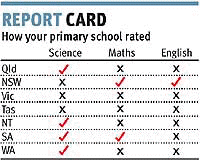|
News & Views item - September 2005 |
![]()
Outcomes-based Education Fails the Test Says Report Commission by Minister for Education, Brendan Nelson. (September 29, 2005)
 |
|
Graphic credit: The Australian |
Dr Kevin Donnelly, executive director of Education Strategies was commissioned by the Minister for Education, Science and Training, Brendan Nelson, to assess, benchmark and report on Australian primary school curricula. Dr Donnelly's 108 page report has now been published by Dr Nelson and is a damning appraisal of "outcomes-based education" (OBE), the approached embraced by the Northern Territory and the six states.
Dr Nelson told The Australian "I am alarmed but I am not surprised. What's concerning me is we are being outperformed internationally by countries that used to be under performing in relation to us," while Dr Donnelly is quoted by The Sun-Herald as saying, "Not only have the states and territories persevered with a jargon-ridden, faddish and obsolete OBE approach to curriculum development, but an analysis of Australian curriculum documents in mathematics, science and English shows, compared to better performing overseas systems, that ours are largely second rate. In Tasmania, these include 'thinking, communicating, personal futures, social responsibility and world futures'. South Australia defines essential learnings as 'futures, identity, interdependence, thinking and communication' on the basis that 'These understandings, capabilities and dispositions are personal and intellectual qualities, not bodies of knowledge'."
According to the Donnelly report, "[S]ince the early 1990s, Australian states and territories have adopted various versions of outcomes-based education (OBE). Stronger systems, as measured by the TIMSS [Trends in International Mathematics and Science Study] results and the curriculum analysis associated with this report, in opposition to Australia, adopt a syllabus or a standards approach."
Below is the report's tabular comparison of the three approaches. And the reports states that while it is addressing the primary school curricula its assessment is also appropriate for secondary secondary schools.
|
|
Syllabus |
Outcomes-based Education |
Standards |
|
1 |
detail what students should be taught/expected to learn at the start of the year |
focus on what students should achieve or be able to do by the end of the process |
identify what students should know and be able to do at the end of a set time |
|
2 |
relate to specific year levels |
address levels which incorporate a number of year levels |
focus on specific year levels |
|
3 |
mandated number of hours | number of hours, generally speaking, not stipulated | number of hours not stipulated |
| 4 | differentiated curriculum where students are streamed according to interests and ability | common curriculum with mixed ability teaching | common curriculum |
| 5 | based on established disciplines/categories of knowledge | multidisciplinary approach and emphasis on attitudes, dispositions and feelings | based on established disciplines/categories of knowledge |
| 6 | curriculum descriptors specific, easily understood, concise and measurable | curriculum descriptors vague, hard to measure and overly generalised | curriculum descriptors specific, easily understood, concise and measurable |
| 7 | summative assessment with high risk tests and consequences for failure, expectation that essential knowledge, understanding and skills are mastered at each year level | developmental approach to learning; focus on criteria based, formative assessment based on levels/bands that incorporate 2 to 3 year levels | expectation that essential knowledge, understanding and skills are mastered at each year level, summative assessment with some US states expecting students to repeat a year if standards not met |
| 8 | greater use of direct instruction and explicit teaching | constructivist approach to learning | greater focus on direct instruction and explicit teaching |
| 9 | emphasis on teacher directed, whole class teaching | teacher as a facilitator with a student-centred approach to teaching and learning | emphasis on teacher directed, whole class teaching |
The overriding recommendation made by the report is:
[C]onsideration should be given to developing Australia wide syllabus documents, initially, in the areas of primary school mathematics, science and English. Such syllabuses would provide teachers with a clear and succinct road map of the essential learning required related to year levels. Such documents would acknowledge the various state and territory intended curriculum outcomes as well as international research and best practice.
Certainly the recommendation sits well with Dr Nelson who had repeatedly shown a strong desire to centralise control of education at all levels.
What this report does not address is the lack of competence of the teachers to instruct in mathematics or the sciences. No amount of manipulation of curricula will circumvent the problem in our primary and particularly our secondary schools. Teachers lack adequate knowledge in the subjects they are being directed to teach and not until both the states and the federal government are prepared to successfully overcome that gross deficiency will appropriate corrective measures be achieved.
Perhaps the superficiality of the report is no better demonstrated than by its observation:
The Western Australian report, Investing in Government Schools: Putting Children First, also acknowledges the pressures placed on teachers by having to implement OBE as embodied in the Curriculum Frameworks document:
Existing structure, strategies and operations of the central and district offices are inadequate to the task of implementing major curriculum change through the Curriculum Framework. Many schools and teachers are experiencing significant difficulty in engaging with the requirements of an outcomes approach.
Department of Education Services, 2001, p 1